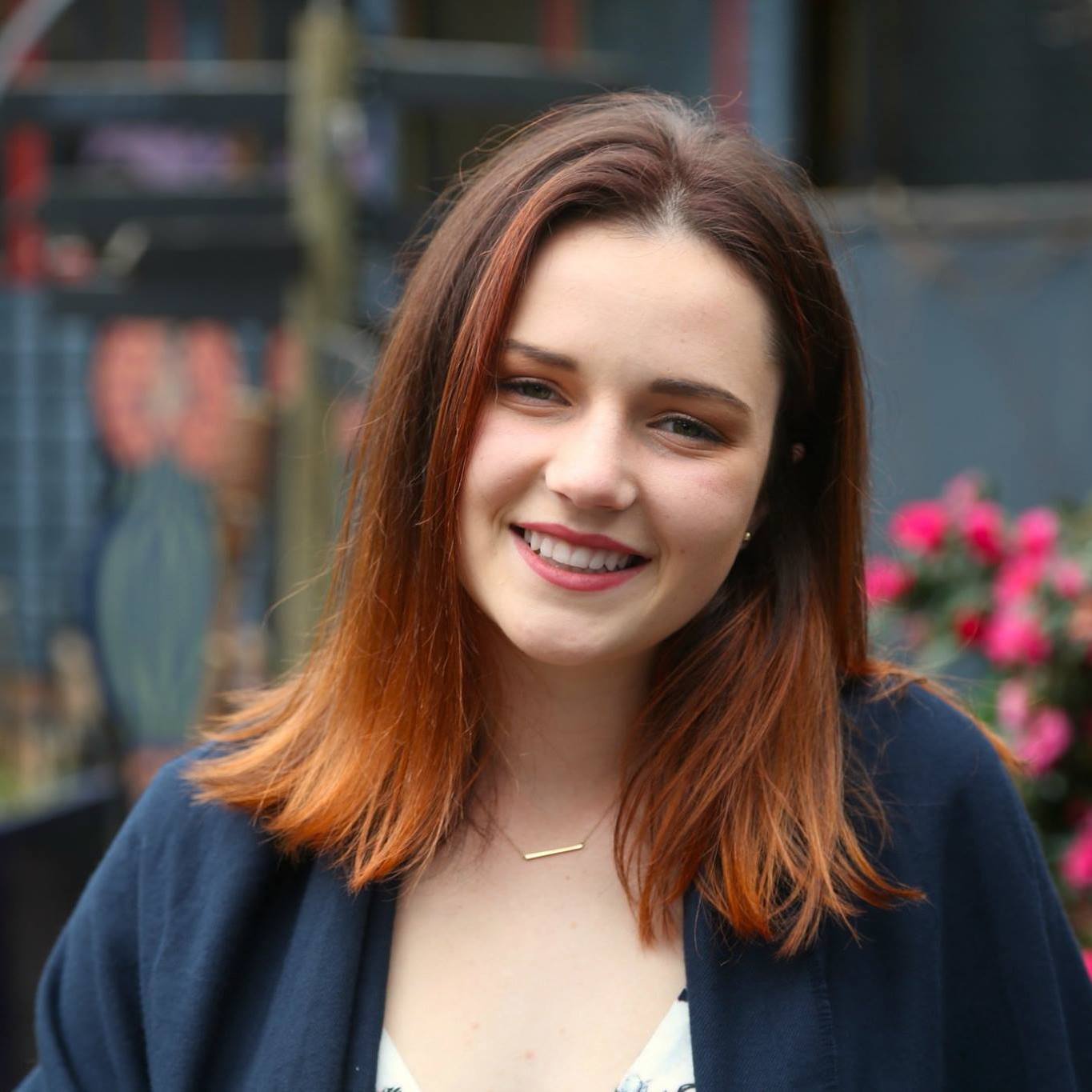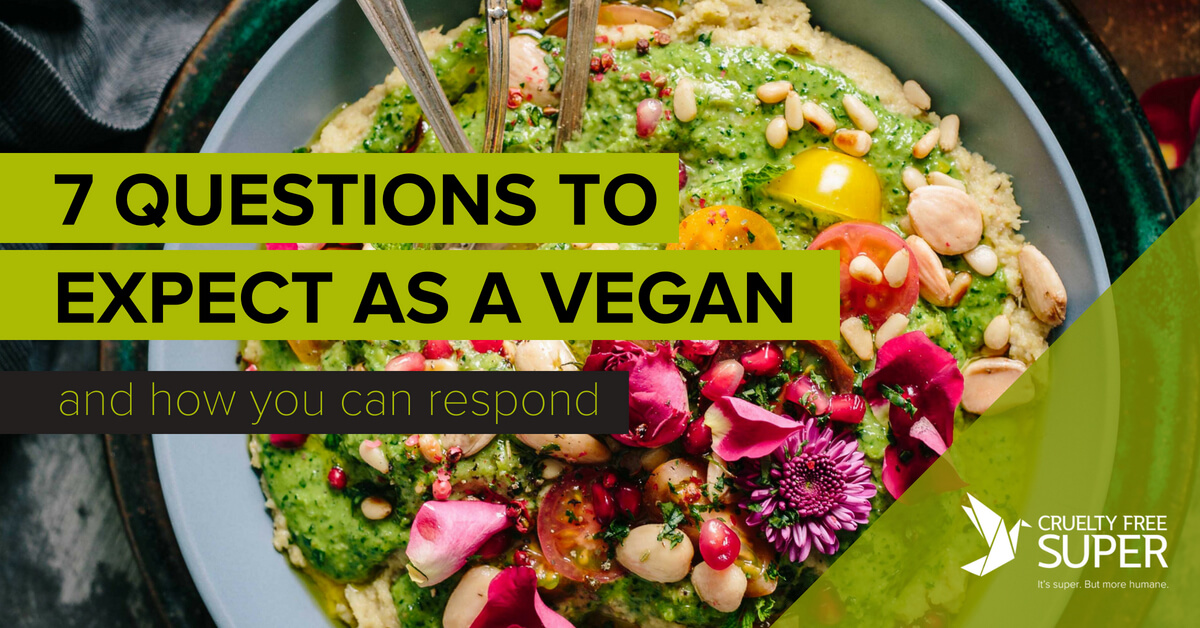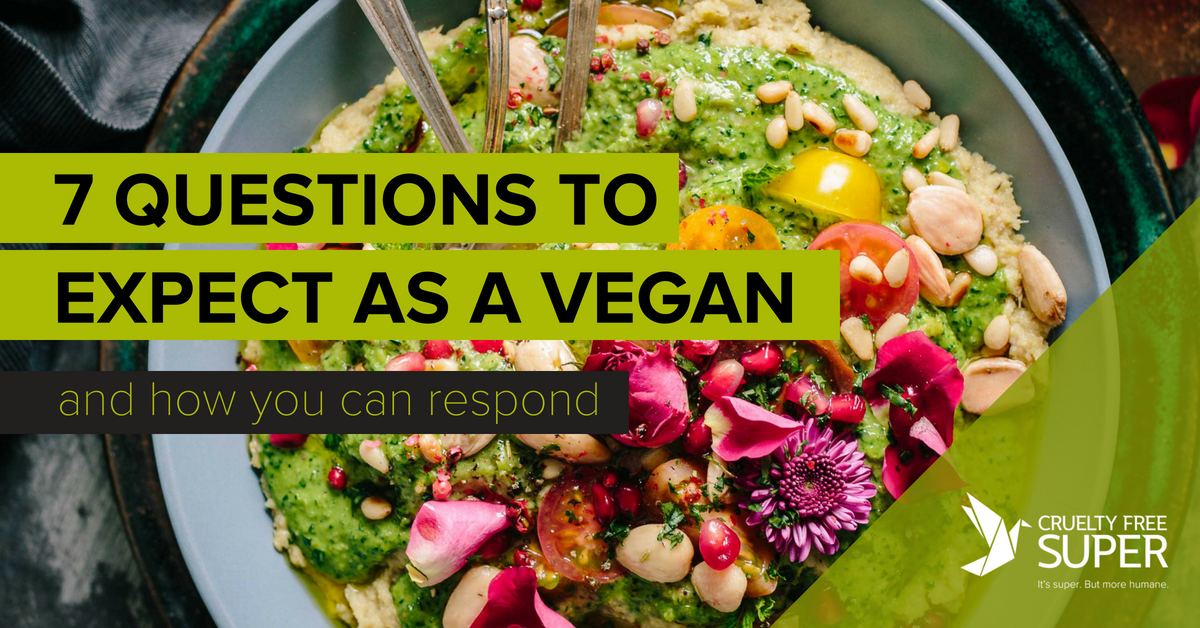Giving up all animal products is something many people don’t understand. It's not uncommon to get a barrage of questions, silly statements and sometimes downright offensive assertions when you disclose to people that you're vegan. Prepare for this and you’ll be able to answer questions confidently, with humour, with a factual statement, or something that might even get them to do a full 180 and make the switch to animal-free too.
Here are some questions you can expect and possible responses...
Q: Doesn’t a vegan diet make you unhealthy and weak?
Answer: Vegans typically have lower cholesterol levels, lower blood pressure, lower body mass indexes, a lower risk of death from heart disease, and lower overall cancer rates than meat eaters. The Mayo Clinic in the US reported that a plant-based diet can
add years to your life.
In terms of weakness, there are tons of athletes, including weightlifters, sprinters and marathon runners who adopt a vegan diet. Tennis star
Venus Williams has been a vegan since 2011 and claims it helps her on the court. Long distance runner, Scott Jurek, winner of 16 prestigious ultramarathon titles, can run 165.7 miles in 24-hours on a vegan diet. Get inspired by these vegan athletes
here!
Q: Without animal protein, how do you build muscle mass?
Answer: It’s important to remember that cows, gorillas and elephants all maintain a vegan diet. They’re not small, are they? Besides, there are plenty of protein sources that support muscle mass in the right amounts, from kale and hemp to nut butters, quinoa, tofu and lentils. One cup of tempeh, for example, contains about 30 grams of protein, the equivalent of five eggs or a regular hamburger patty.
Q: We’ve always eaten meat. Why go against the grain?
Answer: There are plenty of things that humans have done in the name of health, but just because we’ve done it in the past, doesn’t make it right in today’s world. Once upon a time, it was normal to take
heroin cough syrup or drink radioactive water. Smoking tobacco has also been a normal activity of humans. Thankfully, humans have the ability to change their habits when it no longer matches with the way they want to live their life (or in those cases, turns out to be pretty harmful).
Q: Isn’t choosing humane animal products enough?
Answer: There are always going to be producers that claim they are humane that
aren’t actually humane. The reality is that without checking farms and factories yourself, you never really know. I choose to play it safe by refraining from animal products altogether. That way I don’t need to ask friends and restaurants where they source the food they’ve cooked.
Q: Isn’t being vegetarian enough?
Answer: For some, yes. But for me, dairy is scary. Google
pastoral dairy farms and you’ll be alarmed by what you find. A mother cow only produces milk when she
gets pregnant, so, starting from 15 months old, she will likely be artificially inseminated in order to give birth to continually produce milk. The process is brutal and painful. Plus, imagine being pregnant for most of your life and repeatedly having your baby taken away within 36 hours. Unsurprisingly, a dairy farm is filled with the cries of new mothers wondering where their babies are.
Q: How do you live without bacon?
Answer: I, like you, think that pigs are special. Way beyond how they taste. Pigs are
smarter than cats and dogs and are capable of learning words and phrases and solving problems. They can even play computer games. I’d much rather have one as a pet than have one on my plate.
Q: What would happen to all the animals if everyone stopped eating them?
Answer: The fear of what will happen to the animals if the world was vegan varies from the world being overrun by animals to animals becoming extinct. In reality, neither would happen. If demand for animals as food died out, there would be no need for us to breed them in the way we do. We could set up large nature reserves and finally let them breed in a natural way. With more space for forests, woods and reserves (currently taken up by growing crops to fatten up animals), other species of animals would thrive.
Other statements you might hear include:
“Humans are physically designed to eat meat.”
Response: Actually, they’re not. Our teeth and mouths are the wrong shape to be able to kill and hold captive struggling prey. That’s why we need to cook our meat before eating it and why we are no good at munching on bones. Originally humans were vegans, and when our ancestors started hunting one and a half million years ago, meat formed just a very small part of their diet. Eating meat alone would cause us to get very sick, whereas it’s perfectly possible to survive well on just plants.
“Animals can’t feel pain”
Response: Most animals have nervous systems very similar to our own. When they are harmed, their bodies react in a very similar way to ours. They writhe in pain, squeal and try to escape. That’s why so much money is spent on the design of abattoirs and machinery. It’s to accommodate for the pain and fear that animals feel.
“I don’t see the point in going vegan – others will continue to eat animals and animal products – one person can’t make a difference”
Response: You’re right - it’s likely that we as a human race will be eating meat and animal products for a long time to come. But that’s no reason not to take action. And yes, individually it’s hard to make impact, but just like the climate change advocates have moved from ‘individual action’ to ‘movement building’, I also see the power of a movement of people moving to plant-based diets and refusing to fund the production of animal products. For example, I moved my super into an
ethical, cruelty-free super fund, so that I can know for certain my retirement savings will never be invested in the cruelty and exploitation of animals for human gain. To me, I see how a movement like that can really make whole industries think twice about the harm they’re doing - especially if it stops being financially viable.
Managing the social implications of veganism
The reality is that once you’ve been a vegan for a while, you’ll realise that there are certain social implications you have to get used to. Yes, it’s frustrating, but try to remember why you’re doing it. Also, perhaps as a movement we should adopt the attitude that being asked questions is a good thing. It means that what we are doing is interesting to others and each response opportunity we get is a chance to clear up misconceptions. Vegans are often stereotyped, but respond well and we could change people’s attitudes forever.
Remember too that there is no mould for veganism. Follow your own path and respond honestly.
Disclaimers
We love writing about cruelty-free investing and creating a kinder world, but please be aware that the information provided is general in nature, not personal or financial advice. When we discuss companies, it's not a recommendation to buy, hold or sell shares in that company. If we mention returns, please remember that past performance isn't a reliable indicator of future performance. Before acting on any information provided, you should consider if it's appropriate to you.
About the author: Freya Brent

Freya grew up surrounded by passionate advocates for all things good. She is particularly intrigued (read: angered) by the mountains of waste the human race produces. Freya has been thinking about her power as a consumer since she was 9 years old and turned away every piece of meat her family served on the dinner table. She has worked as a youth ambassador for OzHarvest Canberra and is trying her best to go 12 months without purchasing any new clothes (op shops only!). Freya is a proud and relentless feminist who is happy to speak her mind, especially when she hears people say "there's no such things a sexism in today's workforce". Freya likes to write about biodegradable toothbrushes, her journey to becoming a minimalist millennial, and her dream to live off the grid in a micro home with a year round veggie garden. Freya is our resident handball player, and we love to watch her cut it up on the court as well as in her kitchen when she bakes delicious vegan goodies for the office.





